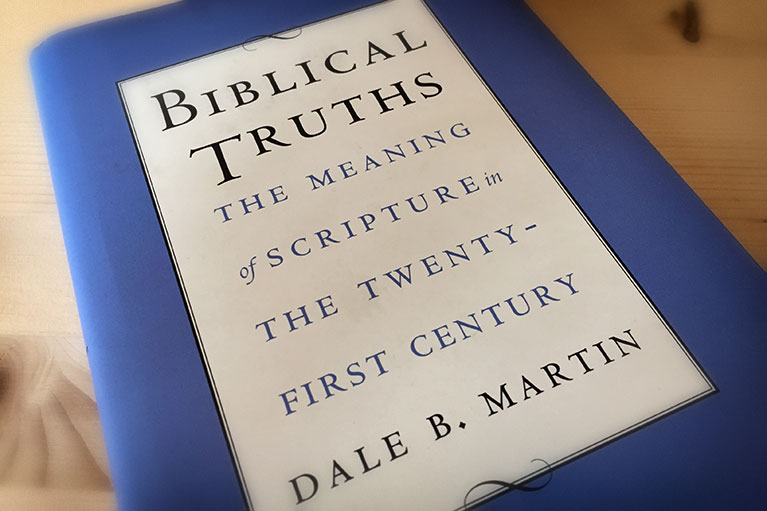
Over the years that this blog has been running, we’ve devoted a great deal of space to countering the dominant theological propositions of fundamentalist Christianity. But this inevitably leads to questions about alternatives: If a literal, “plain-text” reading of the Bible, especially as informed by modern evangelical theology, isn’t the “right” way to read the text, then what is?
How are we — Christians who reject limited, self-serving conceptions of God, who reject the absolute authority of an inerrant Bible, who reject the misogyny and homophobia of the modern Church, who, indeed, reject much of the “modern” part of church in general — how are we to think about our faith? How can we thoughtfully — and faithfully — wrestle with the theological issues at the heart of Christianity?
In response to such questions, I can now enthusiastically recommend Yale theologian Dale Martin’s new book, Biblical Truths: The Meaning of Scripture in the Twenty-first Century.
This 408 page volume (including a bibliography and subject, author, and scriptural indices), offers nothing less than a “nonfoundationalist, postmodern, Marxist, orthodox, ecumenical, and provisional theological interpretation of the New Testament” (32), in which Martin explains “why and how I continue to find traditional Christian doctrines and confessions ‘true,’ why I’m willing to confess the creeds, even though I am a critical scholar who knows much of the Bible is not ‘true’ when taken as history or science” (31).
Organized as a systematic theology text, Martin thoughtfully discusses the ins and outs of virtually every aspect of Christian faith, grouped under the general topics of Knowledge, Scripture, God, Christ, Spirit, Human, and Church. Steeped in biblical examples, Martin’s theological explorations are challenging and engaging, offering eye-opening counterpoints to modern historical criticism.
Martin takes the standard methods of biblical interpretation to task for being insufficient for building a meaningful and robust Christian theology. These methodologies, in which primacy is placed on understanding what the biblical texts would have meant for the original authors and readers, simply cannot sustain Christian faith in light of all we know about history and science. Martin concludes that “modern theologies of the New Testament were failures from a Christian point of view precisely because what they ended up offering was bad history, bad theology, or both” (18).
For Martin, the basic interpretive methods that are pervasive in most seminaries and bible classes today are, in essence, a dead-end:
“As long as Christian scholars insist that they are simply ‘describing’ the theology that is really ‘in’ the text itself, and they arrive at their conclusions using historical criticism, as long as the ‘meaning’ they claim to ‘find’ in the text is supposed to be also what the ancient author ‘intended’ or the ancient audience would have understood, they cannot produce robust, sufficient, orthodox Christian theology.” (28)
Instead, Martin offers a biblical theology centered around “creative anachronism,” reading into the text “views I would not say are simply in the text” (31). For Martin, we cannot simply turn to the pages of the Bible to discover Christian theology. Rather, the text of the Bible is something to be used in order to “think theologically” (31).
And, this methodology is guided by an overriding principle:
“Any interpretation of scripture that does not work for the good of ourselves and our fellow human beings to the glory of God cannot be the ‘literal’ and true meaning of that passage of scripture. The rule is applicable to all Christian epistemology. The beginning and end of Christian knowing must be the rule of love.” (70)
This hermetic of love leads Martin to conclusions such as this one, regarding the role of the church as a place of refuge:
“… the church can never be a space of escape from controversy and struggle. Learning to love one another–including others very different from ourselves and including those outside the church, such as Jews, Muslims, and others of whatever religion, agnostics, atheists, or just ‘indifferents’–is difficult. But the church must become a space where that learning can take place.” (348)
I have but two criticisms to level at this book, and both are mild. First, as a book that seeks to provide an overview of virtually all of Christian theology, too many topics were addressed in tantalizing brevity. Though Martin does an admirable job explicating past, present, and new theological understandings, many of his proposals merit much deeper discussion. Fortunately, the plentiful footnotes and extensive bibliography provide welcome resources for further study.
Second, since this book is published by an academic press, it’s a bit pricey, weighing in at $40 for the hardback. But I’d argue that it’s worth every penny and then some. Just like the theology it discusses, it’s the sort of book that’s worth returning to again and again. I know I’ll be opening its pages many times over the next few months and, if you find contemorary Christain theology as fascinating and as important as I do, I’d strongly suggest you do so as well.
Find out more about Biblical Truths: The Meaning of Scripture in the Twenty-first Century here.
 Dan Wilkinson
Dan Wilkinson
Dan is the Executive Editor of the Unfundamentalist blog. He is a writer, graphic designer and IT specialist. He lives in Montana, is married and lives with two cats.